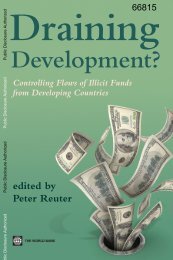rural-urban dynamics_report.pdf - Khazar University
rural-urban dynamics_report.pdf - Khazar University
rural-urban dynamics_report.pdf - Khazar University
You also want an ePaper? Increase the reach of your titles
YUMPU automatically turns print PDFs into web optimized ePapers that Google loves.
168 URBANIZATION AND THE MDGS GLOBAL MONITORING REPORT 2013<br />
BOX 3A.2 The EBRD’s integrated approach to transition challenges in Almaty’s <strong>urban</strong><br />
transport sector<br />
Fueled by a number of factors, including economic,<br />
social, and structural changes in Kazakhstan over the<br />
past decade, the population of Almaty, the country’s<br />
largest city, has been steadily growing. This growth is<br />
in large part a result of internal migration of the workforce<br />
from <strong>rural</strong> areas. The population of Almaty is<br />
expected to reach 1.6 million before 2015, up from 1.1<br />
million in 2000. In the <strong>urban</strong> transport sector, population<br />
growth has been punctuated by a steady rise in<br />
private car usage, which subsequently led to a change<br />
in Almaty’s transport pattern. The car fleet in circulation<br />
increased from 218,000 in 2003 to 560,000 in<br />
2011. Greater reliance on cars has increased road congestion,<br />
and air quality in Almaty has been severely<br />
affected by pollution from traffic, and in particular,<br />
by emissions resulting from the use of low-quality<br />
fuel, a badly maintained and outdated private car<br />
fleet, and ever increasing congestion compounded by<br />
insufficient road management. In general, there has<br />
been an underinvestment in public transport solutions<br />
and traffic and parking management; institutional<br />
weaknesses and deficiencies in regulatory frameworks<br />
have also been identified as issues detrimental to the<br />
effective development of <strong>urban</strong> transport.<br />
To address these complex challenges, the European<br />
Bank for Reconstruction and Development<br />
(EBRD) is pursuing an integrated approach to the<br />
<strong>urban</strong> transport sector in Almaty involving investments<br />
in target projects coupled with extensive<br />
technical cooperation and policy dialogue activities.<br />
Together, these activities aim at setting new standards<br />
for service quality in public transport, establishing a<br />
solid foundation for the introduction of a new regulatory<br />
framework in the sector, and integrating private<br />
operators into a single client-oriented system with significantly<br />
improved service standards. To address the<br />
growing traffic problems and increasing dependence<br />
on private car usage, the EBRD’s investments aim at<br />
increasing the capacity and standards of public transport<br />
services as an alternative to car usage and providing<br />
an overall balanced approach to <strong>urban</strong> mobility<br />
with viable travel choices for users. The investment<br />
projects include major investments in a modernized,<br />
clean <strong>urban</strong> bus and trolleybus fleet to provide a cost<br />
benchmark to the private sector. Finally, an integrated<br />
e-ticketing system operated under a build-operatetransfer<br />
concession will be implemented across all<br />
public transport services to allow for network benefits<br />
(that is, increased ridership spurred by free transport<br />
modal transfers) to accrue to the operators.<br />
The EBRD’s policy dialogue will focus on institutional<br />
development of the sector in Almaty and will<br />
include, among other activities, design and implementation<br />
of a robust regulatory approach through<br />
creation of a new <strong>urban</strong> transport authority; improvements<br />
in the contractual agreements to enable financing<br />
investments by private operators; and introduction<br />
of an integrated electronic fare collection system.<br />
In parallel, the EBRD’s efforts will be complemented<br />
by assistance from the World Bank and the United<br />
Nations Development Programme to support the city<br />
in developing a computer-based traffic model, a new<br />
comprehensive route scheme, and carbon emission<br />
reduction assessment methodologies for the sector,<br />
all of which will help to improve the functioning of<br />
and benefits produced by the transport sector. It is<br />
expected that the EBRD’s activities in <strong>urban</strong> transport<br />
in Almaty, in close collaboration with other<br />
international financial institutions, will contribute to<br />
creating efficient and effective market mechanisms in<br />
this sector and help mitigate negative consequences of<br />
<strong>urban</strong>ization in Almaty.<br />
strengthen the regulatory and institutional<br />
framework (box 3A.2).<br />
Inter-American Development<br />
Bank<br />
The Inter-American Development Bank<br />
(IDB) established an Emerging and Sustainable<br />
Cities Initiative (ESCI) in 2011, since<br />
<strong>urban</strong>ization is taking place at a very fast<br />
pace in Latin America and the Caribbean.<br />
Urbanization in the region rose from 62 percent<br />
in 1980 to 81 percent in 2011, making<br />
it the second most <strong>urban</strong>ized region in the<br />
world. If this trend continues, in 20 years<br />
90 percent or more of the region’s population<br />
will be living in cities. Although megacities<br />
are more prevalent in Latin America<br />
than in developing countries in other regions,<br />
it is now intermediate-size cities that are

















